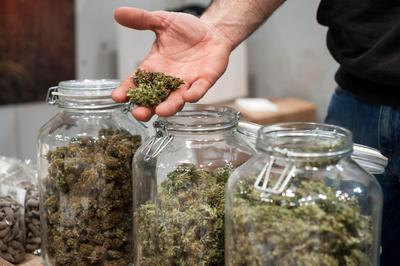73% of Occasional Marijuana Smokers Returned to THC Within 30 Days After Their Pre-Employment Drug Screening
Health Street surveyed nearly 600 participants from locations around the country, 84 percent of whom are employed. Out of those, half were required to take a drug test.

New Data from Health Street Study is Clear: Impact of Pre-Employment Drug Testing Alone is Dramatic but Ephemeral.
It is widely assumed that pre-employment drug screening weeds out drug users. But how effective is this approach? Our new study makes it urgently clear: while pre-employment drug screening has a dramatic impact on marijuana use in the days and weeks immediately prior to the pre-employment test, marijuana users go right back to using the drug, just in time to be employed by the company that required the test in the first place.
What our new Research Says About Pre-Employment Drug Testing
A new study conducted by Health Street conducted by Health Street makes it clear that pre-employment marijuana screening is a short-lived deterrent, strongly suggesting that random drug testing is a more effective strategy for employers seeking the benefits of a drug-free workplace.
Health Street surveyed nearly 600 participants from locations around the country, 84 percent of whom are employed. Out of those, half were required to take a drug test that detects marijuana upon beginning employment at their current jobs.
Of those required to take a drug test, a shocking 28% smoked in the day directly following their pre-employment drug test, striking an visual image of someone lighting up as they walked out of the clinic. Another 17% smoked in the two to three-day span afterwards. Overall, 57% of respondents smoked within a week after the drug screen. A total of 73% of respondents had smoked marijuana at least once in the month directly after their pre-employment drug screening.
Rather than preventing the job candidates from using THC, pre-employment screening instead seemed to provide an assurance that no further hurdles were ahead.
In a complementary question, the same respondents were asked the degree to which an upcoming drug test detered them from using marijuana in the span leading up to the test. Only 11% did not abstain at all, with over 69% of respondents abstaining for a week or more. Clearly -- a looming screening provided much more incentive to cut back on drug use than a previous one.
Assessing the Alternatives to Pre-Employment Drug Screening
This evidence tells us that pre-employment drug screening isn't enough if you want to facilitate a drug-free workplace. And, despite increasing laxness about drug use in the legislative sphere, there are still plenty of reasons to pursue one; employers who are diligent about keeping their workplace free of drug use can see decreased rates of absences, tardiness, injuries and worker compensation claims, keeping their employees safe, and improving employee retention.
Since nothing is stopping new employees from using drugs after their pre-employment drug test, employers who understand and desire the proven ROI of a drug-free workplace need to consider less predictable and longer-term options, such as random drug screening.
Random drug testing is a stronger deterrent to drug users because employees can't plan their drug use around upcoming screening times. After a computer-generated, non-biased random selection process chooses an employee to drug test, they're put back into the same general pool of employee names that could be chosen at random. In other words, if they were tested in this month, that doesn't mean they don't have a chance for being tested again next month.
Keep in mind, a random drug test is different from a reasonable suspicion drug test. Although employers are allowed to drug test their employees based on reasonable suspicion (which isn't random at all), they should be trained on how to identify the signs and symptoms of drug use, and on how to document and communicate those indicators. Untrained supervisors are far more likely to trip into communicating with the suspected employee in ways that can create discriminatory issues or other legal problems.
Safety-sensitive workers (including pilots, bus drivers and truck drivers) and nuclear power plant workers are required to undergo random drug testing, as mandated by the U.S. Department of Transportation (DOT) and the Nuclear Regulatory Commission (NRC), respectively. However, there are several other industries in which private employers should be doing random drug testing due to safety and economic concerns that arise when employees use drugs.
Industries that Can Benefit from Random Drug Testing
When it comes to the prevalence of drug abuse, not all industries are created equal. In the health care and veterinary fields, employees have access to prescription drugs and, as a result, have a higher rate of prescription drug abuse. The construction industry has one of the highest rates of drug and alcohol use, even though it's filled with positions that are safety-sensitive. Shockingly, research showsl="noopener">research shows that 40 percent of construction fatalities are related to substance use. Beyond being a huge safety concern, drug use on construction sites undoubtedly affects a company's bottom line from losses in productivity.
Other major industries that can benefit from random drug testing:
Benefits of Random Drug Testing for Every Industry
Besides improving productivity and safety, a drug-free workplace can also have other benefits. Health insurance providers offer discounts to companies whose workplace drug testing policies meet certain standards. In many states, like Florida, employers with a drug-free workplace program in place qualify for discounted workers' compensation insurance premiums as long as they follow all state laws surrounding the program.
Key Takeaways
Employers that require pre-employment drug tests are rightly concerned about the impact that employee drug use has on the health and safety of their workforce, their customers, and their bottom line. But the longstanding approach of requiring a single, pre-employment drug test - and never addressing the issue again - is simply ineffective. Our study shows that drug testing reduces use prior to the test, but not afterwards. The clearest and simplest solution is to set up a random drug testing pool to establish a long-term deterrent and an effective drug-free workplace. Contact us for information on how we can help you achieve this.





